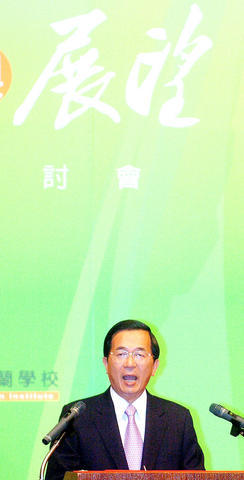Investors can expect a positive day of trading on the local bourse today after concerns President Chen Shui-bian (
"No news is good news for the stock market," Jason Huang (黃崇恩), an assistant manager at UOB Investment Advisor (Taiwan) Ltd, said in a telephone interview yesterday.
The nation's stock market was sluggish last week with daily turnover shrinking to as low as NT$66.4 billion (US$2 billion) as investors grew cautious ahead of Chen's speech, which has negatively impacted on the market in recent years.

PHOTO: GEORGE TSORNG, TAIPEI TIMES
Chen, however, did not touch on issues related to cross-strait relations yesterday.
Taiwan's equity market, a laggard in the region, is expected to strengthen this week and catch up with neighboring markets that may remain robust despite the Chinese government's latest round of tightening measures announced last week, Huang said.
UOB Investment expects the TAIEX to fluctuate between 7,900 points and 8,100 points this week.
The Chinese government announced last Friday it would raise interest rates in a bid to rein in its runaway economic growth and investment activities.
The country, however, also relaxed the trading band of its currency against the US dollar before a bilateral high-level meeting in Washington this week, in which the currency rate is expected to top the agenda.
The relaxation is expected to attract more fund inflows into the region to bolster Asian stock markets that could to some extent stimulate the TAIEX, Huang said.
The recently weak NT dollar could strengthen in the near future along with other Asian currencies boosted by the rising yuan after the relaxation, which could pump international funds into the region, the analyst said.
This may help curb capital outflow fueled by depreciating local currency and in turn benefit the local equity market with better capital momentum, he said.
Foreign and local institutional investors combined sold a net NT$14.78 billion worth of shares last week, according to Taiwan Stock Exchange data, amid the cautious investment atmosphere and weak NT dollar.
Meanwhile, Macquarie Equity Research said it is time to readjust the underweight position of Taiwan's market.
"We expect growth to accelerate in the second half of this year, driven by stronger export growth as a cyclical turnaround in the technology sector materializes," the Australian brokerage said in a research note released last week.

To many, Tatu City on the outskirts of Nairobi looks like a success. The first city entirely built by a private company to be operational in east Africa, with about 25,000 people living and working there, it accounts for about two-thirds of all foreign investment in Kenya. Its low-tax status has attracted more than 100 businesses including Heineken, coffee brand Dormans, and the biggest call-center and cold-chain transport firms in the region. However, to some local politicians, Tatu City has looked more like a target for extortion. A parade of governors have demanded land worth millions of dollars in exchange

Hong Kong authorities ramped up sales of the local dollar as the greenback’s slide threatened the foreign-exchange peg. The Hong Kong Monetary Authority (HKMA) sold a record HK$60.5 billion (US$7.8 billion) of the city’s currency, according to an alert sent on its Bloomberg page yesterday in Asia, after it tested the upper end of its trading band. That added to the HK$56.1 billion of sales versus the greenback since Friday. The rapid intervention signals efforts from the city’s authorities to limit the local currency’s moves within its HK$7.75 to HK$7.85 per US dollar trading band. Heavy sales of the local dollar by

Taiwan Semiconductor Manufacturing Co’s (TSMC, 台積電) revenue jumped 48 percent last month, underscoring how electronics firms scrambled to acquire essential components before global tariffs took effect. The main chipmaker for Apple Inc and Nvidia Corp reported monthly sales of NT$349.6 billion (US$11.6 billion). That compares with the average analysts’ estimate for a 38 percent rise in second-quarter revenue. US President Donald Trump’s trade war is prompting economists to retool GDP forecasts worldwide, casting doubt over the outlook for everything from iPhone demand to computing and datacenter construction. However, TSMC — a barometer for global tech spending given its central role in the

The Financial Supervisory Commission (FSC) yesterday met with some of the nation’s largest insurance companies as a skyrocketing New Taiwan dollar piles pressure on their hundreds of billions of dollars in US bond investments. The commission has asked some life insurance firms, among the biggest Asian holders of US debt, to discuss how the rapidly strengthening NT dollar has impacted their operations, people familiar with the matter said. The meeting took place as the NT dollar jumped as much as 5 percent yesterday, its biggest intraday gain in more than three decades. The local currency surged as exporters rushed to